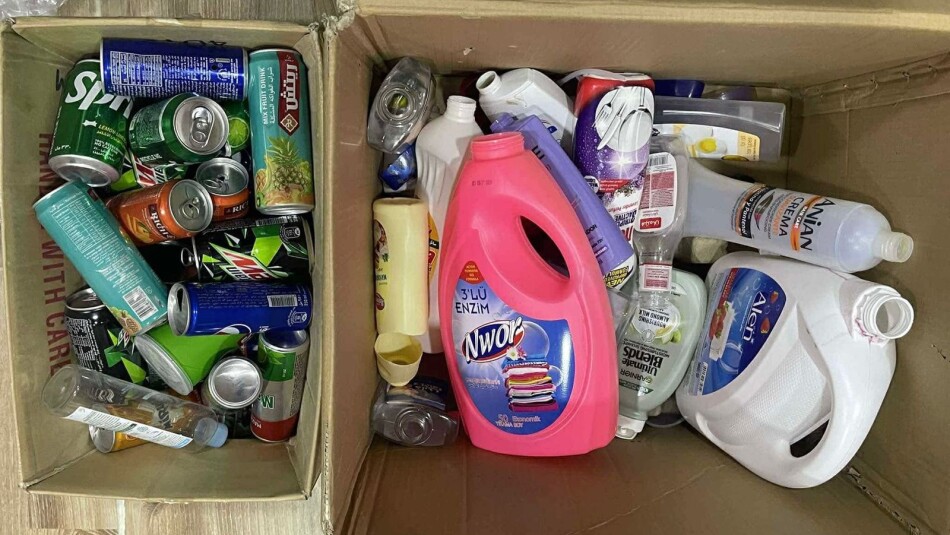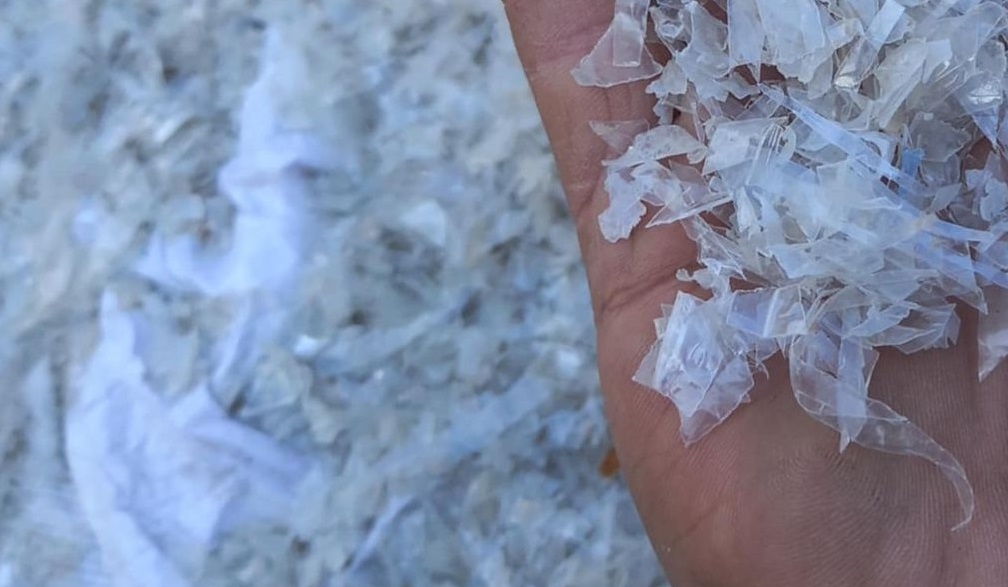
“Please don't mix plastic with your garbage anymore, we need it separately,” reads a sign posted by dustmen in front of Sakar Michael's house.
Since then, in addition to a dustbin for collecting food waste, another clear bag containing only plastic can be seen in front of Sakar's house in Sulaimaniyah Northern Province. Dustmen or other people sell the plastic waste to recycling factories separately.
"Dustmen are very happy that I don't mix waste, although it is a very small income for them, but what is important is that they can keep the environment and climate clean," Sakar said.
Environmental concerns have become public concerns
Collecting plastic waste and trying to recycle it is a two-party mission. Some people, like Sakar, do not mix the waste and separate the plastic themselves, while others drive the plastic waste to recycling plants.
Saz Sirwan, a 32-year-old dentist, said she saw a video on a friend's Facebook account four years ago about the harmful effects of plastic on the environment, with the goal of reaching recycling plants."
“I collect cans of shampoo, water and cold drinks, along with buckets of yogurt, at home and abroad. Then I reduce them so that they don't take up too much space It is a clean environment.
Lanja Ahmad, a teacher, is one of those who collects plastic and metal waste alone and does not mix it with food waste.
“After piling the plastic waste, I contact the Environment and Life group to take the plastic and metal waste for recycling,” she said.
The group "Environment and Life" is active on Facebook and spreads environmental awareness, and they have set up a contact number so that people can call them whenever they have plastic waste.

"Our environmental awareness has caused a lot of people to stop mixing waste anymore. Whenever they have a lot of plastic waste, they contact us and we have cars and we go and collect it from them," said Jutyar Hawez, who runs the Environment and Life group.
In general, environmental awareness is increasing on the issue of waste separation. Lanja says she never uses disposable plastic table covers and doesn't throw away batteries.
According to the municipality, over 1,000 tons of garbage is collected daily in Sulaimaniyah, but no accurate figures how much is plastic.
San Saravan, a member of the Sulaimaniyah Nature and Property Protection Board, said 10% of the world's oil production goes to the manufacture of plastic.
Environmental cleanup and job opportunities
While collecting plastic is part of keeping the environment clean, it has become a source of livelihood and daily business for some people, both during collection and recycling.
“They collect and store plastic for me, and I give them dishes, cups and glasses instead,” said Hassan Ali, who collects waste in his car in Sulaimaniyah and Chamchamal district.
He takes the plastics to recycling factories. “As far as I know, the factories there grind them and make other things out of them, or they send them abroad.”
He collects between 50 to 60 kilograms kg, sometimes up to 100 kg, and sells them to recycling factories for 150 Iraqi dinars IQD (USD0,1) per kilogram.
Mohammed Hawkar, who lives in Khabat neighborhood of Sulaimaniyah, collects 60 to 70 kilograms of plastic daily on a three-wheeled motorcycle.
“I have been doing this for seven years. About 20 to 30 people call me every week to collect plastic.
The Environment and Life group, which started on a Facebook page, now collects the waste themselves, grinds it and prepares it for investment.
"Several people collect the plastic for me, and I have hired several workers to grind the plastic, which we then sell to recycling factories," said Jutiar Hawez, director of the group.
There are seven types of plastic, 99% of which are made from oil and gas, only 1% percent from plants and starch, Saravn said.
"It is expected that 50% of oil production will go to plastics this century, which poses a huge risk," he added.
Part of plastics of some small factories are crushed and then sold to factories that invest in the plastics again.
“We give the grind plastics to the Piramagrun factory or other factories in Erbil. They reproduce pipes or boxes locally and export some of them abroad,” Hawez said.
“Our goal is to protect our land and environment before material gain, because we do not want to destroy our land for the next few years,” he added.
It is unclear how many tons of plastic are collected monthly through house-to-house campaigns, but 25 tons of plastic are collected monthly at the Chawarta recycling plant in Tanjaro landfill alone.
Jabar Mahmoud, director of Chwarta factory, which only grinds the plastic, said, “What comes to us is plastic from the Sulaimaniyah warehouse, such as boxes, water cans, plastic in the streets and houses We will give them 150 dinars for a kilogram.”
Some of the plastics at the Pirmagrun factory are turned into boxes for farmers or agricultural pipes, Mahmoud added.

Kamil Rostam, owner of a plastic recycling factory in Chamchamal, described his work as a collective campaign. “In addition to the municipality, which is responsible for cleaning up waste, many people are doing the same, but more for collecting plastic, minerals and cardboards.”
“Compared to the past two years, it is difficult to see plastic and cardboard on the streets. It has become a source of employment for many people. In addition, factories and drivers are all job opportunities for people,” Kamil said.
Simple Technique for a big challenge
Reuse and recycling of solid waste and food is one of the ways to combat environmental pollution, according to UN statistics. Iraq has been named the fifth-most vulnerable country to climate breakdown, affected by soaring temperatures, insufficient and diminishing rainfall, intensified droughts and water scarcity, frequent sand and dust storms, and flooding. However, this collective initiative is seen as a simple technique.
"The problem is that the materials that are recycled from plastic are recycled into plastic that is not environmentally friendly," Saravan said.
“In the Kurdistan Region, recycling has not become a major pillar for environmental protection. What is available is recycled from plastic,” he added.
Dr. Zhino Khalid, an environmental expert, believes, "Irresponsible use of plastic and lack of high awareness in society, with the lack of great recycling capacity, including in developing countries, are the main causes of environmental pollution.”
"Plastic affects the body directly through the air and soil, through plants to animals and from there to humans when we eat meat, and through water because 12.7 tons of plastic enters the oceans annually," she added.
According to the Ministry of Health of the Kurdistan Region of Iraq (KRG), 9,911 new cases of cancer have been registered in 2023 alone.
“Sometimes we are insulted and made fun of,” said Runak Rashid, 52, a woman who collects plastic and prepares it for factories.
The director of the Chwarta factory said the reduction of 100 dinars per kilogram, because they do not allow the collected plastic to be exported to neighboring countries which has had a great impact on those who collect plastic and for their factory.
“We are about to shut down because in this way we do not generate any profits.”
*This story has been produced as part of the program to expand the role of women journalists in environmental coverage, implemented by KirkukNow Media Outlet and financially supported by the Ministry of Foreign Affairs of the Federal Republic of Germany.